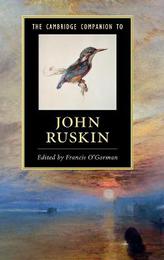
|
The Cambridge Companion to John Ruskin
Hardback
Main Details
Description
John Ruskin (1819-1900), one of the leading literary, aesthetic and intellectual figures of the middle and late Victorian period, and a significant influence on writers from Tolstoy to Proust, has established his claim as a major writer of English prose. This collection of essays brings together leading experts from a wide range of disciplines to analyse his ideas in the context of his life and work. Topics include Ruskin's Europe, architecture, technology, autobiography, art, gender, and his rich influence even in the contemporary world. This is the first multi-authored expert collection to assess the totality of Ruskin's achievement and to open up the deep coherence of a troubled but dazzling mind. A chronology and guide to further reading contribute to the usefulness of the volume for students and scholars.
Author Biography
Francis O'Gorman is the author of Worrying: A Cultural and Literary History (2015). His other recent publications include editions of Elizabeth Gaskell's Sylvia's Lovers (2014), Anthony Trollope's Framley Parsonage (co-edited with Katherine Mullin, 2014) and Ruskin's Praeterita (2012), and The Cambridge Companion to Victorian Culture (2010). He is a Professor in the School of English at the University of Leeds.
Reviews'This is a timely and well-crafted work, demonstrating in a persuasive and subtle way how worthwhile it is to revisit and re-evaluate John Ruskin.' Languages and Literature
|